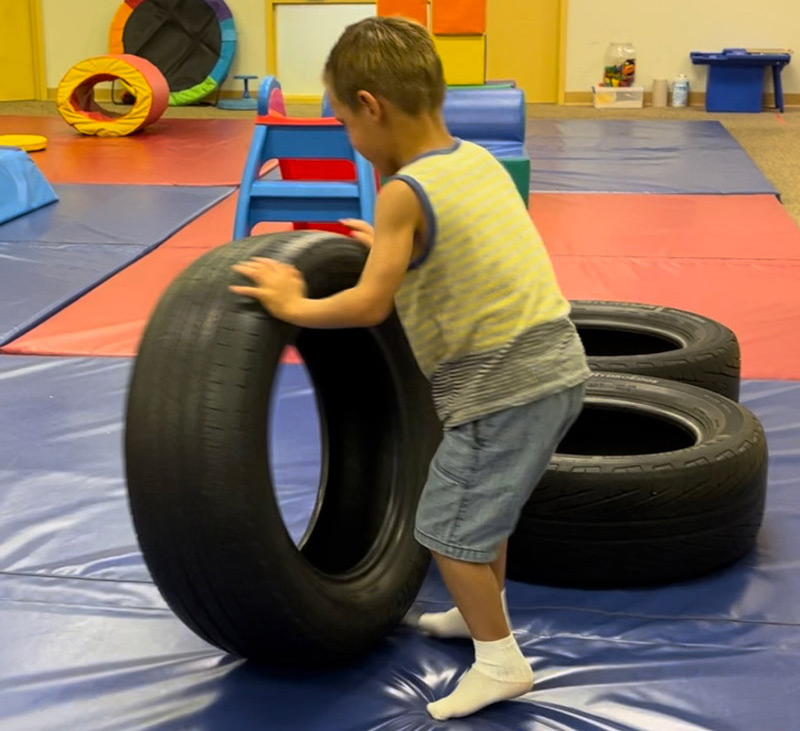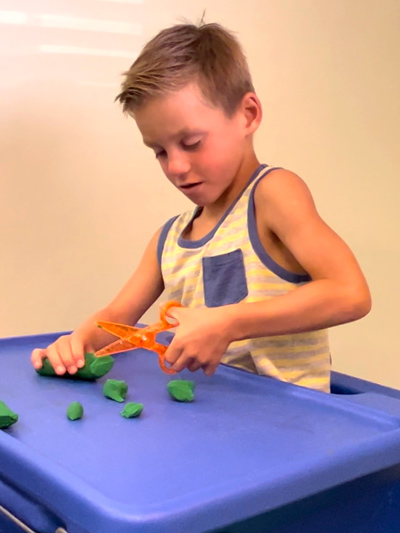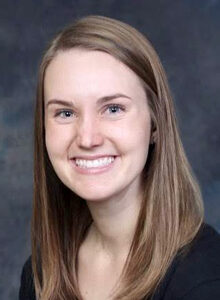In the Eastern European country of Ukraine where there are more than 44 million residents (Archer, Harper, & Cameron, 2020), there are just 3 ergotherapists (Ukrainian translation for occupational therapists) in practice (Imas & Lazarieva, 2017). Though Ukrainian health officials recognize the usefulness of the occupational therapy (OT) profession, establishment of the profession has been slow (Golyk et al., 2021). Importantly, the incorporation of OT in Ukraine is needed due to mental and physical suffering coinciding with ongoing armed conflict, as well as an increase in child mortality, and children with disabilities living longer (Kamiya, 2021).

A child demonstrates an example of heavy work to the proprioceptive system by lifting and flipping readily accessible repurposed tires
Conflict aside, areas of Ukraine are equipped with technology to support telehealth platforms including highspeed internet, laptop computers, microphones, and video cameras (Armstrong, et al., 2021). This evidence-based project used those resources to provide education and training via asynchronous telehealth connection to interprofessionals working with children who have autism spectrum disorder (ASD) on topics relevant to pediatric OT including oral motor, sensory motor, and fine motor skills. Such training allows children in an underserved Ukrainian community to reap the benefits of occupational therapy services until such a time that OT is an established health service there.
Background
A needs assessment was completed prior to this project’s implementation. Participating Ukrainian interprofessionals indicated interest through survey completion in learning occupational therapy techniques to better serve Ukrainian children, particularly those with ASD. Education and training in fine motor skills, oral motor skills, and sensory integration per their request, delivered by a pediatric occupational therapist, coupled with interventions by those on the Ukrainian interprofessional team, will serve to further enhance the developmental process for Ukrainian children with ASD.
Project Overview
A pediatric clinic in Kyiv, Ukraine chose to collaborate on this project. The clinic currently has child psychologists, speech therapists, and special education teachers employed (Коло сім’ї [Family Circle], 2012). Though these interprofessionals are equipped to provide speech therapy, behavioral therapy, and social skills training for children with ASD, they are not trained to provide specialized therapies in sensory integration or sensory feeding. They are also ill-equipped to provide therapy for fine motor deficits which often hinder school readiness and school performance (Family Circle, 2012). With the addition of occupational therapy techniques in sensory integration, feeding, and fine motor, services provided by the interprofessionals in the clinic will be more all-encompassing, giving children with ASD even greater opportunity to perform at their best in school and in daily life.
Project Implications
Ukrainian interprofessionals in the clinic and other stakeholders, namely the children with ASD receiving services there along with their parents/guardians, glean the benefits of the addition of OT recommendations made through training and education. When asked what they hope to learn from the shared virtual experience, respondents relayed they want to learn about occupational therapy, train with an occupational therapist, and share recommendations by an occupational therapist (Armstrong et al., 2021).
Project Outcomes

A child demonstrates an example of fine motor and
visual motor refinement by snipping dough with scissors
Upon completion of this project, the collaborating clinic in Kyiv received three asynchronous training webinars created and presented by pediatric occupational therapist Ashley Slemp Held, OTD, OTR/L, for review and implementation. Webinars included: 1) Hand Skills in Children 2) Sensory Processing in Children and 3) Feeding Dysfunction in Children. The webinars covered such topics as fine motor and oral motor developmental milestones, problems with and strategies to improve hand skills, emotional regulation for sensory system health, effective use of sensory diets, and recommendations for feeding difficulties. The goal of the webinar series was to equip the clinic’s interprofessionals with knowledge to fulfill the unmet occupational therapy-related needs of children served at the clinic.
Project Carryover
Once the Ukrainian interprofessional team viewed the webinar series, they began carrying out suggestions and strategies provided in the webinars. The interprofessionals have direct communication with the designer of the webinar series for support and clarification. Scheduled video conference calls allow the interprofessional team and the occupational therapist to collaborate in offering individualized occupational therapy recommendations based on the needs of particular children.
Project Equipment and Supplies
Development of the webinar series required video recording capabilities using the Zoom (Zoom Communications Inc., 2022) platform, highspeed internet, an external camera, PowerPoint slides that covered the topics of interest, photos, and videos to support the topics, and YouTube (YouTube, 2022) for sharing the webinars with the Ukrainian team. The series designer collaborated with an outpatient pediatric clinic within her own community to record videos and take pictures of children receiving OT services. The camera footage was included in the webinars to model and demonstrate recommended techniques and strategies. Consent to photograph and/or video webinar subjects was gained via paper-based consent form. The sensory, feeding, and fine motor equipment incorporated into the webinars focused on low tech, easily attainable, or easily fabricated options, including, but not limited to:
- Blanket swings
- Old tire
- Homemade crash pad
- Pillows
- Sand box
- Tactile adventure bins using household goods
- Adaptive feeding options such as utensils, bowls, plates, cups
- Culturally considered foods
- Markers
- Finger paint
- Small manipulatives (coins, cotton swabs, etc.)
- Child sized table and chair
- Adaptive seating options
- Sample sensory diet
Discussion
Consideration was given to space, equipment, and materials already available in the Kyiv clinic. The Zoom recording platform is also used in the clinic. A potential future cost is for a medical interpreter/translator to produce subtitles on each webinar or translate in voice-over format. However, the current plan is for the one Ukrainian interprofessional who speaks English to interpret/translate the webinars for the remaining interprofessionals. Future aims for this project will focus on providing direct OT services to the pediatric clinic in Kyiv via telehealth connection, provided by occupational therapy students as part of their community-based OT class.
Conclusion
The goal of this evidence-based project and the desire of its designer is to meet Ukrainian families where they are – exhausted from likely displacement, traumatized by ongoing war, and searching to find assistance for all children, especially those with unique needs like ASD. May this project lay another stepping stone toward the establishment of occupational therapy in a stable, peaceful Ukraine where all people, regardless of their abilities, are regarded and loved as equal and contributing members to their society.
Acknowledgements
The Author offers heartfelt appreciation and respect to her interprofessional colleagues at Коло сім’ї [Family Circle] in Kyiv, Ukraine, for their willingness to partner with her. She also offers sincerest gratitude to the team at Mini Miracles Pediatric Therapy, PLLC, in Johnson City, TN, for their time, talent, space, and genuine interest in this project. Lastly, she is so thankful to her doctoral advisor, Dr. Alysha Skuthan, for her ever-present guidance and support.
Ashley Slemp Held, OTD, OTR/L is Assistant Professor at Milligan University and was supervised by Alysha Skuthan, PhD, OTR/L, ASDCS, Assistant Professor, Shenandoah University. To contact the author, email akheld@milligan.edu or call (423) 461-1546.
References
Archer, A., Harper, L., & Cameron, D. (2020). Understanding rehabilitation in Ukraine from the perspective of key informants. Disability and Rehabilitation, 42(2), 267-273. https://doi.org/10.1080/09638288.2018.1496488
Armstrong, A., Crussell, C., Grigg, L., & Tipton, W. (2021). [Unpublished raw data on the occupational therapy needs of Ukrainian children in a pediatric clinic]. Milligan University.
Family Circle Коло сім’ї. (2012). Головна • Коло сім’ї (k-s.org.ua)
Golyk, V., Syvak, O., Grabljevec, K., Tederko, P., Gutenbrunner, C., & Nugraha, B. (2021). Five years after development of the national disability, health and rehabilitation plan for Ukraine: Achievements and challenges. Journal of Rehabilitation Medicine, 53(3). https://doi.org/10.2340/16501977-2792
Іmas, Y., & Lazarieva, O. (2017). Pre-conditions and modern development of specialties in physical therapy and ergo-therapy in Ukraine. Фізичне виховання, спорт і культура здоров’я у сучасному суспільстві Physical education, sports and health culture in modern society, 2, 10-15.
Kamiya, Y. (2021). Current situation of children with disabilities in low- and middle-income
countries. Pediatrics International. 63(11), 1277–1281. https://doi.org/10.1111/ped.14904
Youtube. (2022). https://www.youtube.com/
Zoom Communications Inc. (2022). http://zoom.us/






